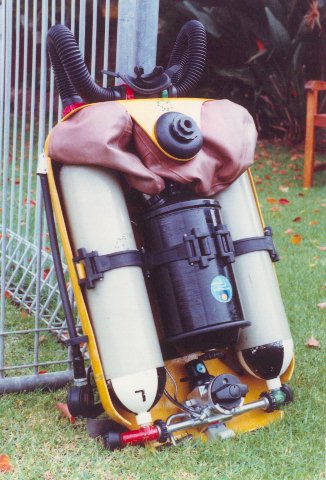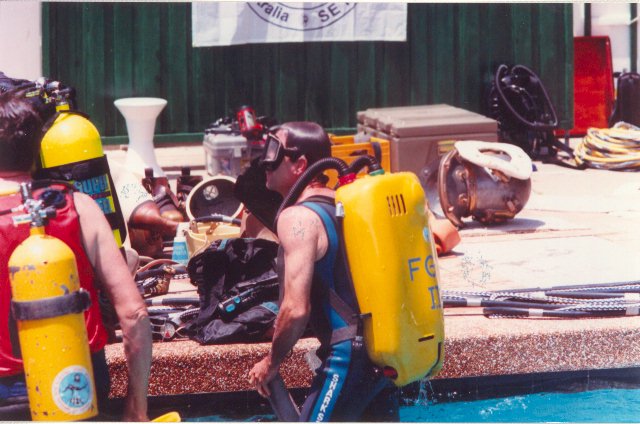

The Draeger FGG III was designed around 1969 for deep diving from a bell using Heliox.
The unit is
The fibreglass reinforced polyester casing contains the twin breathing bags, the refillable soda lime canister, the pressure reducer dosage block, and the two gas cylinders. According to the diving depth one of the three constant dosages can be selected. The apparatus can be used to a maximum diving depth of 200m. The duration can be prolonged by supplementary gas supply from a diving bell or from the surface.
Weight: 28 kg Breathing lime canister volume: ~ 3 kg Cylinder charging pressure: 200 bar Cylinder capacity (each): 4 litres
The dosage block is an orifice type with an intermediate pressure of
40 bar absolute.
Typical usage would be: Diving depth: 50-110m (with max. 1,4bar ppO2: -70m) Gas mixture: 17.5% Oxygen, 82.5% Helium Flow rate : 30 bar*l/min (position 1) Duration: 42 min Diving depth: 90-160m (with max. 1,4bar ppO2: 14-100m) Gas mixture: 12.5% Oxygen, 87.5% Helium Flow rate: 40 bar*l/min (position 2) Duration: 32 min Diving depth: 140-200m (with max. 1,4bar ppO2: 21-130m) Gas mixture: 10% Oxygen, 90% Helium Flow rate: 50 bar*l/min (position 3) Duration: 25 min
These durations may appear to be very short, but remember, these units are designed to do the bottom portion of the dive only, decompression is intended to be carried out in a chamber. The advantage of these units in the depths they are designed for is not extended bottom time, but the great saving in gas volume used. If long bottom times are required, the umbilical can be used. The umbilical connection is via a hose mounted on the right hand side of the case. The hose has a one way valve fitted so if the umbilical supply fails, the gas from the autonomous cylinders will not escape. When operating on the umbilical the necessary supply cylinders and another dosage block are installed in the diving chamber. The on-board cylinders and dosage block then serve as an emergency bail-out.
Jason has been using the unit with nitrox mixes, and because
nitrox mixes are more dense than the prescribed helium
mixes, the flow rates are lower.
Position 1: 8 bar*l/min Position 2: 10.5 bar*l/min Position 3: 21 bar*l/min


The FGT Diver on the picture is Jason's regular dive buddy: Stanley Haviland.
Courtesy Jason Mc Hattan, 30.Mai 1999